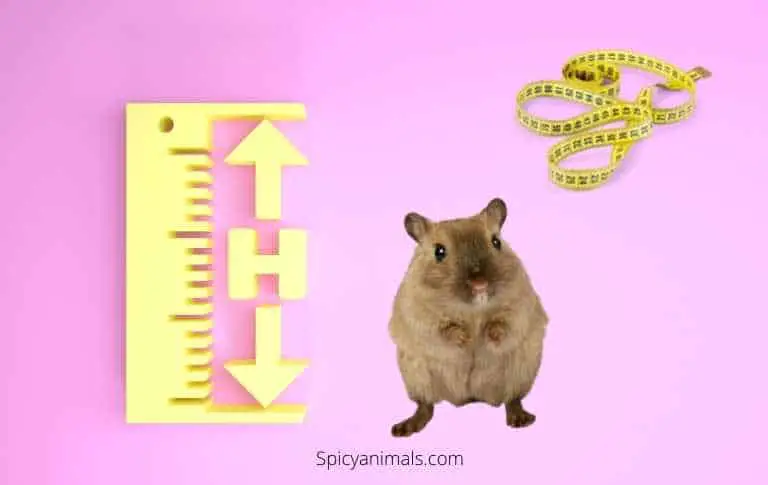Gerbils Teeth Grow Continuously Therefore Gerbils Need to Chew Daily to Keep Their Teeth Short
Are you curious about when gerbils stop growing? This article will answer that question and provide information on the different stages of growth for these rodents.
Gerbils stop growing when they reach their full size. The time it takes to reach this size can vary depending on the species of a gerbil, but most will be fully grown by 6 to 8 months old.
During the first few weeks of life, baby gerbils grow very quickly. They will double in size every week until they are about 4 weeks old. After this, their growth rate will start to slow down and they will only grow about 50% larger by the time they reach adulthood.
How big is a full-grown gerbil?
The specific size of a full-grown gerbil can vary depending on the species, most gerbils are generally quite small and compact.
The largest species, known as the Great Gerbil, typically grow to be about 8 inches long from nose to tail. Conversely, the smallest species of a gerbil, called the Lesser Gerbil, usually tops out at about 4.5 inches in length.
Whether big or small, these feisty little critters are known for their high-energy nature and fast movements, making them a popular choice as pets among animal lovers.
So whether you're looking for a pint-sized pet or a playful companion, gerbils are an excellent choice for anyone seeking some fun and furry companionship!

What Factors Affect a Gerbil's Growth?
There are many factors that can influence the growth of a gerbil, including its diet and living environment. For example, a gerbil's diet is critical to its growth and development.
Gerbils need a nutrient-rich diet that includes plenty of high-quality protein and fresh fruits and vegetables.
Additionally, free access to clean water is essential for hydrating the animal as well as keeping its digestive system functioning properly.
In terms of their living environment, gerbils require adequate space to allow for normal physical activity, along with places where they can hide or burrow if necessary.
Finally, social interactions with other gerbils may also affect their growth, though this will depend on the individual animal's personality and preferences.
Overall, there are many different factors that can influence a gerbil's growth, making it important to give the animal all the resources it needs in order to thrive.
How Can You Tell the Age of A Gerbil?
As gerbils age, they naturally go through many changes. The most obvious signs of old age include weight loss, lack of appetite, and sudden diseases.
However, these signs can also be indicative of other health problems, so it's important to consult with a veterinarian to rule out any underlying conditions.
Alopecia, or hair loss, is another common sign of old age in gerbils. This can be due to a variety of factors, including stress, hormonal imbalances, and nutrient deficiencies.
If your gerbil is showing signs of old age, it's important to take them to the vet for a checkup to ensure that they are healthy and to get advice on how to best care for them in their golden years.
Gerbils are relatively long-lived creatures, with a life expectancy of 3-5 years in captivity. However, there are a few ways to tell the age of a gerbil.
- One is to look at the color of their fur. Young gerbils have dark brown or black fur, which gradually lightens as they age.
- Another way to tell the age of a gerbil is to look at its teeth. Gerbils have two sets of teeth: incisors and molars. The incisors grow continuously throughout the gerbil's life, while the molars only grow until the gerbil reaches adulthood. As a result, older gerbils will have shorter incisors and longer molars than younger ones.
- Finally, you can also tell the age of a gerbil by their behavior. Younger gerbils are more active and playful, while older ones tend to be more sedentary. By keeping these things in mind, you should be able to get a good idea of how old your gerbil is.
Conclusion
The time it takes gerbils to reach their full size can vary depending on the species of a gerbil, but most will be fully grown by 6 to 8 months old.
Diet and living environment are factors for growth. Social interaction with other gerbils may also affect growth.
There are many different factors that can influence a gerbil's growth, making it important to give the animal all the resources it needs in order to thrive.
Gerbils have a life expectancy of 3-5 years. The most obvious signs of old age include weight loss, lack of appetite, and sudden diseases.
However, other signs of aging include shorter incisors, longer molars, and changes in behavior. By keeping these things in mind, you can evaluate the age of your gerbil and ensure that they are healthy and well taken care of.
Source: https://spicyanimals.com/when-do-gerbils-stop-growing/
0 Response to "Gerbils Teeth Grow Continuously Therefore Gerbils Need to Chew Daily to Keep Their Teeth Short"
Post a Comment